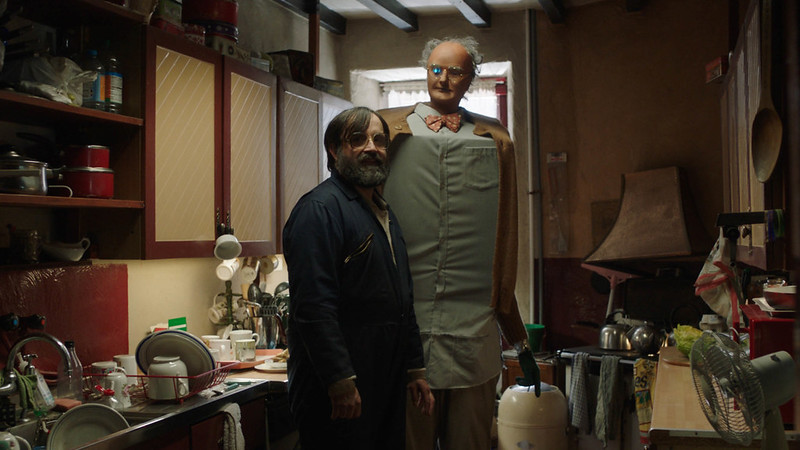The four films in this final round up from Sundance’s World Cinema slate could not be more different in subject or style. From the U.K. the twee comedy “Brian and Charles” sees director Jim Archer adapting his own short film about finding strength in friendships—and robots! Chilean writer/director Francisca Alegría uses fantasy to interrogate environmental pollution in “La Vaca Que Canto Una Cancion Sobre El Futuro (The Cow Who Sang A Song Into The Future)”. Set in his home region of Mexico, Juan Pablo González’s mannered feature film debut “Dos Estaciones” salutes the dying craftsmanship of artisanal tequileros. And my favorite film of the group, Alli Haapasalo’s “Tytöt tytöt tytöt (Girl Picture)” follows three teenage girls over three weekends in search of love and pleasure.
Not every short film translates well into the feature film format, and unfortunately that is the case for “Brian and Charles.” What was a wonderfully weird 13-minute short about depression, isolation, and the power of companionship has been stretched far too thin.
In expanding the story beyond just the relationship between the eccentric Brian (played by British comedian and co-writer David Earl) and his cabbage-loving robot creation Charles (voice by co-writer Chris Hayward), the writers rely heavily on characters who feel like clichés. They’ve added an awkward love interest (an under-used Louise Brealey) and a villain who is basically just a grown up high school bully grown into a town bully. It takes more suspension of disbelief that an entire village would let this man behave this way than it does to believe Brian could build Charles out of a washing machine.
Also held over from the short is the film’s documentary framing, however in this longer iteration it just doesn’t work. In the short, Brian and Charles were interviewed after living together for years, here the documentary crew is already following Brian from the get-go with no explanation. At first it could be interpreted as a commentary on Brian’s mental health, but other characters occasionally acknowledge the never-seen camera crew as well. It might have been less jarring if they leaned a little further into a straight-up mockumentary style.
There are some things that do work. The Wales countryside is striking, and Hayward’s vocal performance as robot Charles, who vaguely looks like a very square Jim Broadbent, is genuinely funny and charming. However, Earl’s eccentricities quickly become grating and by the end you really want a better companion for sweet Charles. What should be a story about the power of companionship inadvertently turns into a cautionary tale about toxic friendships.

With “The Cow Who Sang A Song Into The Future,” the feature film follow up to her 2017 short film “And the Whole Sky Fit in the Dead Cow’s Eye,” Chilean director Francisca Alegría continues to use magical realism as a lens through which to examine the devastation of corporate pollution on the country’s failing ecosystems.
The film opens in a mystical forest, all rich greens and dark browns. If the red and white toadstool mushrooms didn’t signal we’re deep inside a fable, the trancelike cinematography by Inti Briones and the melancholic song of the fish, birds and cows as they head towards death firmly places us there. “Come closer to us,” they chant, “is the end nigh?” they ask.
Emerging from this catastrophe is resurrected matriarch Magdalena (an ethereal, wordless Mia Maestro), whose return from the dead upends her already teetering family. Daughter Cecelia (Leonor Varela) returns to the family dairy ranch to care for her father after a vision of his dead wife causes an episode. In tow are her two children, the eldest of which, Tomás (a tender Enzo Ferrada) feels a kinship for their long-lost grandmother who also didn’t quite fit in this patriarchal world.
Alegría deftly weaves the connection between this family’s broken past and their possible hope for the future, with the reverberations of the ecological disaster at its start. Families are as fragile as any ecosystem, and must be tended with love, empathy and care, not run coldly like a business. “The Cow Who Sang A Song Into The Future” reminds us we should go through life always thinking about how our choices will affect others, including the birds, the bees, and the fish in the seas.

Co-written with Ana Isabel Fernández and Ilana Coleman, director Juan Pablo González’s ode to his homeland of Mexico’s Jalisco Highlands aims to subvert expectations about the region. Inspired by women business owners who have thrived there in recent years, “Dos Estaciones” centers on artisanal tequilera Maria Garcia (a towering Teresa Sánchez) as she fights to keep her family tequila business afloat amidst a plague damaging the agave crops and threats of a buyout from a greedy U.S. company.
The region’s seemingly endless light is beautifully photographed by cinematographer Gerardo Guerra, who captures the inside of Maria’s tequila plant as elegantly as he does the vast agave fields. We’re introduced to Maria with a long tracking shot, her broad shoulders filling the whole frame. She is a titan of industry here, not just supplying jobs in her factory, but supporting other businesses like her hairdresser Tatín (Tatín Vera, a non-professional actor playing a variation of themself).
Like Maria, Tatín is an artist and theirs is a relationship of mutual respect. However the balance of power shifts when Tatín declares they plan to expand their shop without Maria’s help. Sánchez plays this moment quietly, her eyes showing both hurt for not being needed further and also pride for Tatín’s success.
The mannered, deliberate pace of González’s filmmaking matches Maria’s dignified reverence for her craft. The ethereal choral music as she explains how tequila is made brings an almost mythical quality to the process. Sánchez imbues Maria, the last in a long line of true artisans, with such good humor despite her often stoic expressions that when she acts from desperation, you can’t help but root for her to succeed.

Set over three weekends, Alli Haapasalo’s jubilant Finnish coming-of-age film “Girl Picture” is unabashedly girly, horny, romantic, and fun. Written by Daniela Hakulinen and Ilona Ahti, its frank and honest approach of the highs and lows of teenage girldom while showcasing equally complex friendships and sexual escapades is reminiscent of Amy Heckerling’s “Fast Times At Ridgemont High.”
The film’s 4:3 aspect ratio boxes viewers right into the worldview of the girls at its center. Best friends Mimmi (Aamu Milonoff) and Rönkkö (Eleonoora Kauhanen) work together at a smoothie shop in the mall selling punny drinks like “It Takes Two To Mango.” While Mimmi is looking for a can’t-focus-on-anything-but-you kind of love, Rönkkö is on mission to experience pleasure, something that has been distinctly lacking from all her previous sexual encounters.
The filmmakers capture the passion and intensity of young love when Mimmi falls for Emma (Linnea Leino), who has dedicated all of her life to the sport of skating. She’s “lost” her triple lutz and it’s no wonder she finds her budding relationship more rewarding when Mimmi utters lines like, “I love that I can give you pleasure.” The chemistry between Milonoff and Leino is hot hot hot, but the film is smart enough to know that girls who get this close can also cut each other deeply.
Meanwhile, the emotional honesty of Kauhanen’s performance as Rönkkö overcomes her social awkwardness in search of sexual pleasure is a wonder to behold. As we see her experiment with handjobs, cunnilingus, and more there is no judgment, just a journey towards finding what it is she truly enjoys. There’s also a wonderful subversion of teen film tropes; the hot rich guy is not necessarily good at sex and the nice guy waiting in the wings sometimes really should just be a friend.
I can never get enough films about female friendship and “Girl Picture” is a top-notch entry into this subgenre. With its rich characterization, buoyant performances from its three leads, and the warmth of Jarmo Kiuru’s gauzy cinematography, it’s destined for many comfort rewatches in the future.












